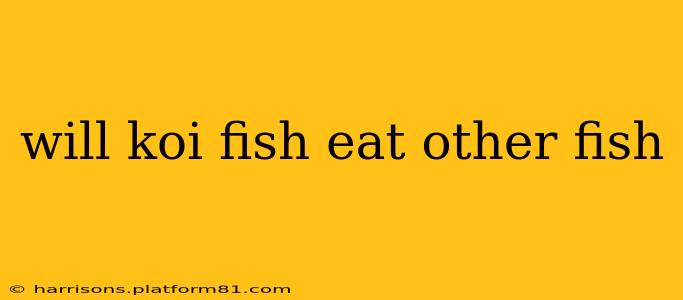Koi, with their vibrant colors and graceful movements, are beloved by pond enthusiasts worldwide. However, a common question arises among potential and current owners: will koi fish eat other fish? The answer, unfortunately, isn't a simple yes or no. It depends on several factors, including the size of the koi, the size and species of the other fish, and the overall environment of the pond.
What Factors Determine if Koi Will Eat Other Fish?
Several key factors influence whether your koi will turn into fin-nibbling predators. Let's explore them in detail:
Size of the Koi:
Smaller koi are less likely to prey on other fish. Their focus is primarily on readily available food sources like commercially available koi pellets. Larger koi, however, possess a more robust appetite and a stronger predatory instinct. A large koi might view smaller fish as a convenient meal.
Size and Species of Other Fish:
This is arguably the most crucial factor. Koi are opportunistic feeders. If they encounter a fish small enough to fit in their mouths, they might try to eat it. Smaller, slower-moving fish are at greater risk than larger, more agile species. For example, a small goldfish might become a snack for a large koi, while a robust, fast-swimming goldfish might be safe.
Availability of Food:
A well-fed koi is less likely to hunt other fish. If your koi are consistently receiving a balanced and sufficient diet, they are less inclined to view tank mates as a food source. Consistent feeding helps prevent your koi from developing predatory habits.
Pond Environment:
Overcrowding in a pond can increase the likelihood of aggression and predation. Insufficient hiding places for smaller fish can make them easy targets for hungry koi. A well-designed pond with ample plants and structures provides shelter for smaller fish, reducing the risk of predation.
What Fish Are Safe to Keep with Koi?
While no fish is entirely "safe" from a large, hungry koi, some species are better suited to cohabitating than others. These typically include:
- Larger, more robust fish: Fish that are comparable in size or larger than the koi are less likely to become prey.
- Fast-moving fish: Fish that can quickly escape the koi's attempts to catch them are safer.
- Fish with defensive mechanisms: Fish with spines, sharp fins, or other defensive features may deter koi.
Can Koi Eat Their Own Young?
Yes, unfortunately, larger koi can and sometimes will eat their own young (fry). This is a natural behavior in many fish species. Providing ample hiding places and a well-planted area in the pond can help mitigate this risk.
How to Prevent Koi from Eating Other Fish?
- Provide ample food: Ensure your koi receive a sufficient and balanced diet.
- Choose compatible tank mates: Select fish that are unlikely to become prey.
- Create a suitable environment: A well-designed pond with ample hiding places and plants reduces the risk of predation.
- Monitor your pond regularly: Observe your fish to identify any signs of aggression or predation.
What to Do if Your Koi are Eating Other Fish?
If you observe your koi eating other fish, you may need to re-evaluate your pond's setup and your feeding strategy. Consider separating the koi or removing the vulnerable fish to ensure their safety. A larger pond with more hiding places might also alleviate the issue.
By understanding these factors and taking proactive steps, you can significantly reduce the risk of your koi eating other fish and maintain a harmonious aquatic community in your pond. Remember, responsible pond ownership involves careful planning and observation to create a thriving and peaceful environment for all your aquatic inhabitants.
